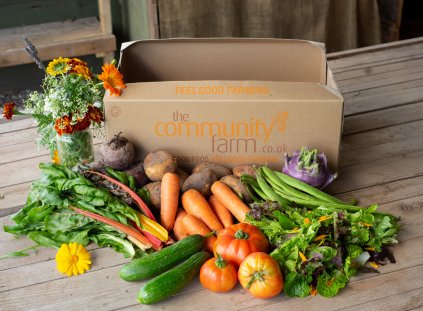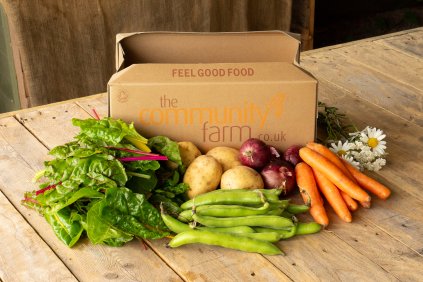Wasted food is the cause of a whopping 8% of all global greenhouse gas emissions! As a food producer and retailer, we recognise that we have a role to play in reducing our waste: on our fields, in the warehouse and by working with our customers.
We are also always working to minimise the environmental impact of our packaging. There’s constantly new packaging options in development and we do our best to keep up to date with the latest thinking, by keeping our processes and suppliers under constant review.
Wasted Food
By choosing to sell veg boxes, we’re able to make a big dent in the wasted food that most retailers have to contend with. That’s because we can work with local producers to choose what goes in the boxes each week, and ensure we sell everything they’ve grown, as well as making sure food is never just sat on a shelf waiting for someone to buy it. Careful crop planning for the fields, and good communications between the growing team and warehouse team means we minimise waste from our fields.
If there’s anything that’s grown and not fit for sale, our volunteers often eagerly take it home too! But we don’t let ugly produce go to waste. We take pride in the fact that some of our vegetables are wonky. We still sell them, as they are perfectly tasty! On the few occasions where we have surplus we call on food projects or food banks to help us find the produce a new home. We even have business customers who make soup, jam or preserves from surplus or damaged fruit and vegetables. And our website is also bursting with recipes to help all of our customers make the most of the seasonal produce in the boxes.
Packaging
Currently, our boxes are made from 98% recycled materials and are 100% recyclable. Each box can be reused dozens of times.
Sadly, food and farming rely heavily on the use of plastic to maintain freshness and product quality. Without plastic, greens like chard and spinach will wilt and rot at a fast rate. The use of paper bags are prohibitive as they dry the produce, and loose greens in veg boxes are not practical because they suffer from atmospheric changes. There is a balance to strike in minimising food waste and packaging waste.
First and foremost we don’t buy in, wrap or package products unnecessarily. Our shorter supply chain, both locally and abroad where we work directly with growers, allows us to minimise the need for wrapped vegetables and fruit, such as peaches, nectarines and cucumbers.
Then there’s the choice of materials. In terms of production, the carbon footprint of producing petroleum based plastic bags is actually smaller than both paper bags (recycled and unbleached) and rubber bands. In fact, this can be up to five times smaller when looking at the CO2 emissions. Plant-based plastic brings a different set of problems. The energy needed to convert plants to plastic is significantly more than normal plastic, increasing their carbon footprint. Also, many plant-based plastics are made from GM plants in a bid to make them more affordable – a practice we do not want to endorse as an organic farm.
The problem with plastic when compared to the alternatives is not the production, but what happens to it once it has been used.
Alternative plant-based “plastics” have been produced to reduce this impact on the environment. These claim to be biodegradable or compostable. However these claims do not solve the problem of end of life treatment. “Plant based” can be up to 80% non-plant based, and isn’t necessarily fully biodegradable or compostable. “Biodegradable” doesn’t define how quickly it degrades and is not recyclable. “Compostable” could require industrial composting (or anaerobic digestion); it’s not just going to rot down in your back garden.
Unfortunately, UK waste systems aren’t set up for biodegradable or compostable plastic. If any biodegradable plastic gets into the recycling chain it can cause entire pallets of plastic to be contaminated and thrown away. Compostable bags that are put into the food waste destined for anaerobic digesters will be removed from the process and sent to landfill because the system cannot tell the difference between these alternatives and petroleum based plastics and composting cannot occur in landfill because there is not enough air circulation. When biodegradable waste rots in landfill without air, harmful greenhouse gases like methane and carbon dioxide are released. Methane is 21 times more harmful as a 'greenhouse gas' than carbon dioxide.
The other challenge we face is that some produce we receive from other suppliers (like mixed salad bags) comes pre-packaged. If we transition to plant-based alternatives, that could mean a mix of materials in the boxes for our customers, increasing the risk of contamination in the recycling or composting processes.
At The Farm, we are currently using plastic which can be reused or recycled. As innovation and research continues to develop, we’ll keep reviewing our approach, and in the meantime, please work with us to reduce our waste. You can ensure we’re able to reuse boxes by returning them to our drivers. And any plastic bags you receive from us can be put back into the box for collection, too. It’s important our cardboard boxes remain dry, so on damp days, it’s necessary to deliver our boxes covered in a recyclable, plastic protection. If you receive a bag, please place your folded box inside and leave both items out for pick-up on your next delivery day.
If you are reading this as a plastic or packaging expert, please do get in touch with us, we’d love to hear your point of view!














